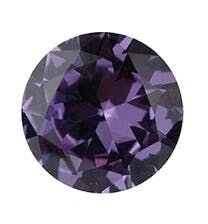June Birthstone: Pearl and Alexandrite

Pearl
Pearl, a gift from the sea, is the world’s first gem and the birthstone for June. It is a traditional gift for brides, graduations, confirmations and the third and thirtieth wedding anniversaries.
The Pearl was, for much of man’s history, the most valuable gem in the world. What changed that is the commercial culturing of Pearls.
To produce a cultured Saltwater Pearl, a mother of Pearl bead, which is made from the shell of the North American Freshwater mussel, must be surgically inserted into the mantle of a host Saltwater Pearl oyster. In addition to this, a piece of epidermis taken from a donor Salt Water Pearl oyster must also be added. If the Pearl lives, it then secretes alternating layers of aragonite platelets (calcium carbonate with water entrained in it) and skin like patches of conchiolin (organic gluelike substance). These reactions build concentric layers, forming the Pearls skin, called the nacre.
Freshwater Pearls are typically cultured without the bead. Just insertion of the foreign tissue into the mantle of the host mollusk is required to form a Freshwater Pearl. It is this lack of a starting bead that causes the formation of a Freshwater Cultured Pearl to be almost identical to the early Natural Pearl that are almost wholly nacre and so rare and so valuable.
Alexandrite
Alexandrite is considered one of the rarest and most amazing gemstones. It was discovered in 1834, in Russia, named in honor of and presented to Alexander II at his coming of age ceremony.
It is a rare form of chrysoberyl that changes from Emerald Green or Blue Green color in daylight to Ruby Red or Violet in incandescent light. The degree of color change will have a great deal to do with its valuation as well as the size, quality of color and clarity.
In 1987 a major find of Alexandrite was found in the Minas Gerais, Brazil. This region has produced the finest gems available since the late 1800's.
Alexandrite is sensitive to heat, alkalines and knocks. It is fairly scratch resistant with a Moh's hardness of eight. It is not usually enhanced and can be ultrasonic or steam cleaned. This makes Alexandrite one of the more everyday wearable stones for connoisseurs and collectors.